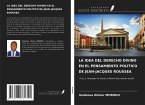J.-J. Rousseau has distinguished himself in the history of political thought as a social contract philosopher who challenged the principle of divine right as the basis of political power. According to this principle, power comes from the will of God. For him, sovereignty rests on the will of men or the general will. However, Rousseau resorts to God to determine the political life of men: 'It would take gods to give laws to men' (J.-J. Rousseau, 1964, p.381). This statement introduces a contradiction into the heart of his political doctrine and leads us to argue that Rousseau remained a supporter of the politics of divine right.
Bitte wählen Sie Ihr Anliegen aus.
Rechnungen
Retourenschein anfordern
Bestellstatus
Storno








